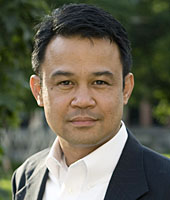AMES, Iowa -- Women who receive postsecondary career and technical education are still being short-changed in their career earnings when compared with male counterparts, according to a study released online today by the Journal of Education for Students Placed at Risk (JESPAR). Researchers with the Department of Educational Leadership and Policy Studies (ELPS) at Iowa State University found that women who completed community college associate degrees earn far less in business, marketing and information technology (IT) careers than men who did not complete their degrees.
The six-year longitudinal study of nearly 1,800 Iowa community college students investigated the relationship between student characteristics -- gender, race/ethnicity, program of study and degree completion -- and their earnings outcomes in the business, marketing and IT fields.
"The interesting thing to me was that even when women complete associate degrees, their earnings are still much less than male students who do not complete degrees. That at least suggests a gender disparity may still exist," said lead author Jonathan Compton, a former ELPS doctoral research associate who is now a research analyst in Iowa State's records and registration department.
Disparity may be artificially inflated
Compton acknowledges that the gender disparity may be artificially inflated because the earnings figures do not consider part-time vs. full-time employment and previous literature has reported that a higher percentage of women turn to part-time employment while raising young children.
The results of this study are based on research led by Frankie Santos Laanan, an ELPS associate professor; and Soko Starobin, an ELPS assistant professor. Since 2004, the Office of Community College Research and Policy in ELPS has collaborated with the Iowa Department of Education, Division of Community Colleges and Workforce Preparation to develop the methodology to examine the economic benefits of Iowa's community college students who enrolled in career and technical education.
The new Iowa State study is one of 12 published in JESPAR highlighting research on youth in poverty for "Pathways to Postsecondary Success," a five-year study funded by the Bill & Melinda Gates Foundation that aims to advance research and provide tools to improve educational opportunities for poor youth not on track to earn a higher education credential.
Among the study's business sample, women with associate degrees made $27,377 on average in 2007 -- five years after graduation -- while men without a degree earned $37,745. Among marketing students, women with an associate degree earned an average of $28,211, while men with no degree earned $35,354.
In IT careers, women who earned associate degrees made 52.1 percent more in 2007 than they did in 2003 -- compared with a 41.5 increase for men with degrees. Yet men without degrees still earned an average of $39,888 in 2007, while women with associate degrees earned just $35,103. And in the first year after graduating with an associate degree, women earned an average of $23,076 -- nearly $7,000 less than men without degrees.
"I think with IT, it's a very complicated career cluster because of certification," said Laanan, who is a leading researcher on community college outcomes. "And one of the limitations of the study is we don't have course level data. We know they [subjects] complete certificates and degrees. Certificates mean something in an IT field. But it's possible in some career clusters that students may need a specific class or course in that area, and not the certificate or degree."
The study uses Iowa Department of Education data for information on student enrollment, student characteristics and degree completion in 2001-02. Iowa Workforce Development unemployment insurance wage data provided information on quarterly wages following departure from community college. Students who transferred or continued enrollment in four-year institutions were removed from the sample. The three career clusters were strategically chosen because they are popular among community college students nationally.
No statistically significant racial disparity
The study's results did not show statistically significant differences in average earnings when comparing race. The researchers suggest that may be a result of having such a small number of ethnic minorities in the Iowa sample.
They were also surprised to learn that few students actually complete degrees in these career areas -- with just under 22 percent earning associate degrees in the study's sample.
"I think community college students are very pragmatic," Compton said. "They get enough courses to get a job and they're satisfied that now it's time to go, saying, 'I've got this job opportunity and now I need to go off to work.' They may not be thinking about the associate degree over the long-term."
The study further confirms that low income students -- those who were recipients of PELL grants -- show large increases in wages when participating in career and technical education programs.
"The PELL aspect is important for this study because it's a proxy for the economically disadvantaged," Laanan said. "In terms of how community colleges serve disadvantaged populations as measured by economics, these findings support that role and how they contribute to human capital development, as reflected by earnings."
ELPS researchers are working on a future study assessing
earnings in other career clusters.

